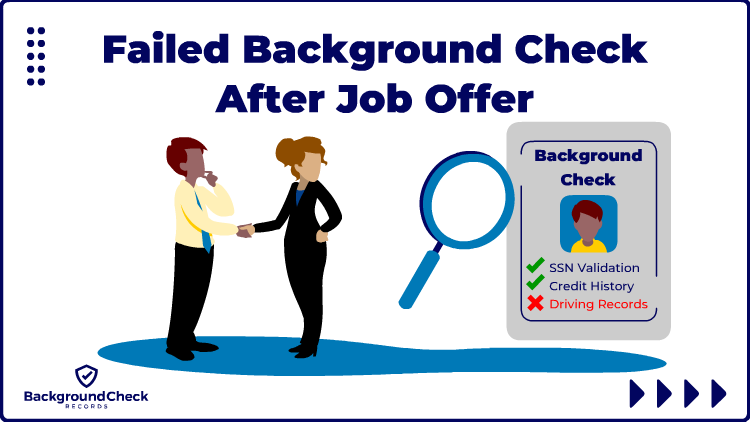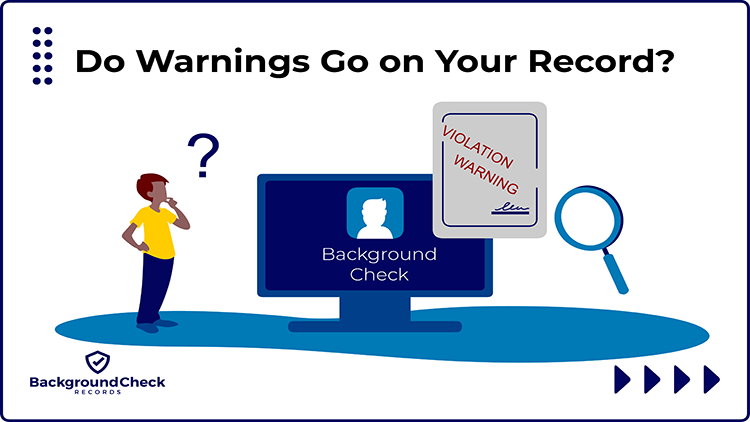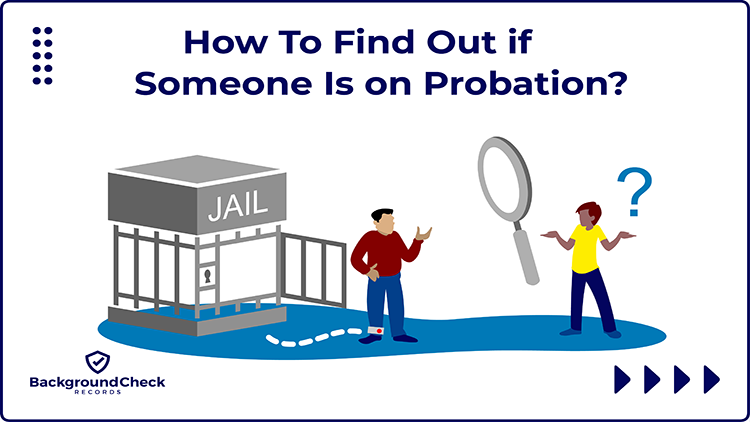Failed Background Check After Job Offer: Employers Guide in 2023
A failed background check after job offer can put a wrench in hiring plans and the employers’ guide of 2023 shows businesses how to deny employment, rescind job offers and move forward while complying with federal FCRA and EEOC laws, as well as state specific Ban the Box laws.
In addition, we’ll explain how hiring policies and disclosure forms can help to protect entities against violations and satisfy some legal obligations as well.
So before breaking the bad news and moving forward, double check you have your ducks in a row so your company remains compliant.
What Employers Need to Know if an Applicant Failed Background Check After Job Offer?
Employers have an obligation to make sure the company, its employees and its customers are safe, and background screenings are one way to determine if a person will disrupt that balance. When a person fails a background check, there are some steps an employer can take even after a job offer has been made.
These steps include requesting further clarification or explanation from the candidate, doing a more comprehensive background check, or rescinding the job offer, however, they must be done carefully.
All of which ensure the background checks with criminal history, education verification, employment verification and credit history can be used in compliance with local, state and federal laws.
For example, an employee might wonder if getting fired goes on their record and legally navigating situations like can be tricky, but learning state laws can help determine what the response should be, and if rescinding a job offer is justified after a failed background check.
In addition, non profit background checks for volunteers should follow the same guidelines as those for paid employees, and the same laws regarding these checks apply.
Legalities When Denying Employment After Failed Background Check
With over one million new hires in August 2022 alone, it’s crucial for employers to know the legalities surrounding failed background checks, especially those surrounding credit and criminal record checks such as the FCRA, EEOC and ban the box laws.1
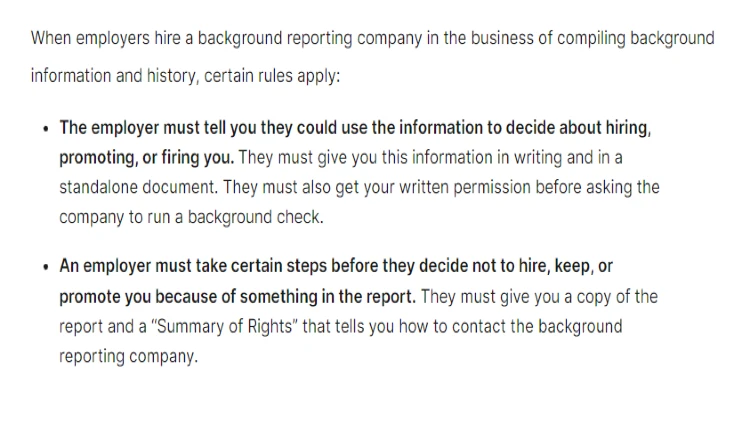
The most common reasons for taking back a job offer is due to a failed criminal history or credit check. Certain positions require a person to show they have used their personal finances and credit responsibly in order to perform the duties of the position. Jobs that typically require a credit check include military duty, accountants or financial planners, correctional officers or law enforcement, certain government employees, and attorneys.2
FCRA Compliance
The Fair Credit Reporting Act (FCRA) outlines what an employer’s responsibilities are regarding credit history screening. The FCRA’s employer guideline establishes criteria that must be met and discusses how to show legal authority to obtain a credit report, how to use the information, and what employers must do when taking steps to recall a job offer due to credit history.
The FCRA procedures requires the person requesting the credit history have a legally permissible reason for the request, and get written consent to conduct a credit screening, including:
- In response to a subpoena by a court in good standing,
- By written consent and instructions of the consumer,
- For use in the following manner:
- For use in credit transactions
- For employment determinations
- Insurance underwriting
- Licensure in certain fields, and
- Investor screening.
To make sure the company is in compliance with federal guidelines, employers must adhere to the rules outlined in the Fair Credit Reporting Act. Under FCRA guidance, employers must do the following when taking adverse action after a failed background check after the job offer has been made:
- Notify the candidate if a background check is used against them,
- A copy of the background check must be provided to the candidate,
- The candidate must be notified of their right to dispute errors or inaccurate information,
- Mistakes must be corrected within 30 days of the dispute being filed,
- Written consent must be obtained before running a background check.
EEOC Compliance
The Equal Employment Opportunity Commission provides guidance to employers to make sure they are in compliance with laws protecting individuals from discrimination based on race, sex, age, or other protected classes of people.
To remain in compliance with federal laws, an employer should do the following:
- Make sure the same standards for background checks are applied to everyone. For example, the same background check is run on women as that run on men.
- Carefully weigh the decision to rescind a job offer based on criminal record when the type offense seems to disproportionately impact a specific race or gender or other protected class. They should also determine if a particular criminal conviction would have a direct impact on the person’s ability to do the job.
- Take disability into consideration and be prepared to make exceptions for negative information caused by disability. For example, a background check reveals bankruptcy; however, the financial issues were caused by the costs of managing a disability rather than irresponsible behaviors.
- Maintain records of the background check and any action taken, including adverse action, for one year following the date of the action.3
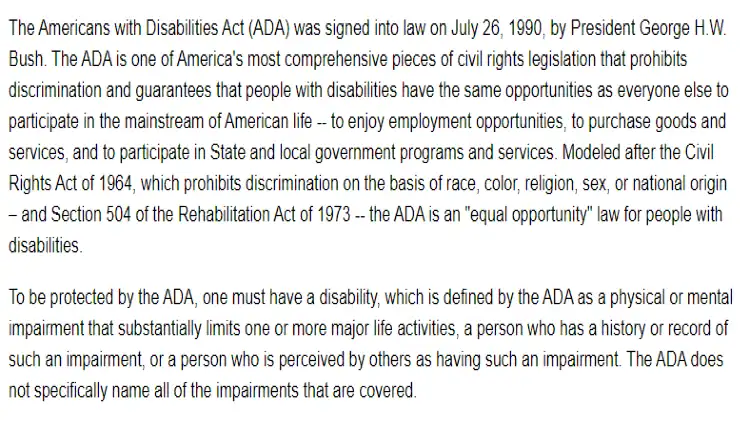
An employer should be well aware of the protections provided by the following federal laws which prohibits using criminal history in a discriminatory manner when rescinding a job offer:
Ban the Box Laws
Ban the box laws are designed to give individuals with criminal convictions a fair chance at employment. Studies show sustainable employment is a huge deterrent to reoffending, and many states have taken steps to remove barriers to employment for those convicted of crimes.
Employers should be well aware of the ban the box laws in the state where the hiring occurs and how to avoid violations of these laws. Ban the box laws place a variety of limits on what information employers can request regarding criminal history, and when inquiries can be made.
For example, in some states applications cannot contain the question asking if someone has been convicted of a crime. This information cannot be accessed until the person has a conditional offer of employment.
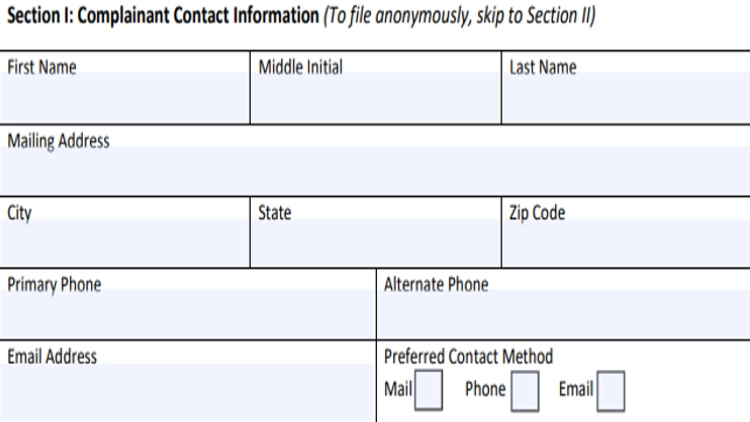
An application that foregoes asking about an applicants criminal history.
The table below links the Ban the Box laws per state with a brief explanation of the statute.
| State |
How the Law Is Applied |
| Alabama |
Currently does not have a state ban the box law |
| Alaska |
Currently does not have a state ban the box law |
| Arizona |
State agencies can only conduct a background check after the first interview |
| Arkansas |
Currently does not have a state ban the box law |
| California |
A job offer must be made before an employer can inquire about criminal history. |
| Colorado |
Employers with more than 11 workers cannot include criminal history questions on application |
| Connecticut |
Criminal history can only be brought up during an interview, or for jobs that a criminal record would prevent a person from having such as law enforcement or corrections. |
| Delaware |
A conditional offer of employment must be made before a criminal record check can be completed |
| Florida |
Currently does not have a state ban the box law |
| Georgia |
State agencies cannot ask about criminal history until later in the hiring process except for jobs that a record alone would impact ability to do just such as police or corrections. |
| Hawaii |
A conditional offer must be made before a criminal history can be completed. The lookback period is also shortened. |
| Idaho |
Currently does not have a state ban the box law |
| Illinois |
An interview or conditional job offer must be made before a criminal record check can be completed. |
| Indiana |
Currently does not have a state ban the box law |
| Iowa |
Currently does not have a state ban the box law |
| Kansas |
Ban the box laws are applicable to state agencies only |
| Kentucky |
Removed some of the barriers to licensing of individuals with criminal records. |
| Louisiana |
State agencies cannot use non-convictions in making hiring decisions. |
| Maine |
Once a person has been deemed qualified, and during the interview phase, can an employer inquire about criminal history. |
| Maryland |
Criminal history check can only be completed after initial interview. |
| Massachusetts |
Application cannot contain questions about criminal history unless specifically required by state or federal law. |
| Michigan |
Questions about convictions have been replaced by affirmation of character statements. |
| Minnesota |
Criminal history searches cannot be made until an interview or conditional job offer is on the table. |
| Mississippi |
Currently does not have a state ban the box law |
| Missouri |
Only inquiries required by state and federal law for certain positions are allowed. |
| Nebraska |
Only after the applicant has met minimum qualifications for the position can criminal history be searched. |
| Nevada |
Ban the box only applies to state agencies prohibiting including questions about convictions on applications. |
| New Hampshire |
Inquiries about criminal history can only be made at or after the interview process. |
| New Jersey |
Applications cannot contain question about criminal history |
| New Mexico |
Once an applicant is considered the final choice for a position can a criminal history report be requested. |
| New York |
An offer of employment must be made before criminal history can be checked. |
| North Carolina |
State agencies only are limited on when criminal history can be conducted. |
| North Dakota |
Criminal history can only be conducted when a person is scheduled for an interview |
| Ohio |
Removes section from applications regarding criminal record. |
| Oklahoma |
State agencies are limited on what and when they can inquire about criminal history. |
| Oregon |
Only at or after the interview stage can an employer conduct a criminal history check. |
| Pennsylvania |
Criminal history can only be conducted after the interview stage. |
| Rhode Island |
Only applications where a criminal record would automatically disqualify a candidate can contain questions about criminal history. |
| South Carolina |
Currently does not have a state ban the box law |
| South Dakota |
Currently does not have a state ban the box law |
| Tennessee |
State employers cannot ask about criminal history on applications. |
| Texas |
Currently does not have a state ban the box law |
| Utah |
Criminal history can only be searched after the interview stage. |
| Vermont |
Criminal history inquiries can only be made after a conditional offer of employment or during the interview stage. |
| Virginia |
Criminal history checks can only be conducted when required by state or federal law for positions such as law enforcement or corrections. |
| Washington |
Criminal history can be conducted only after the person has been initially deemed qualified for the position. |
| West Virginia |
Currently does not have a state ban the box law |
| Wisconsin |
Currently does not have a state ban the box law |
| Wyoming |
Currently does not have a state ban the box law |
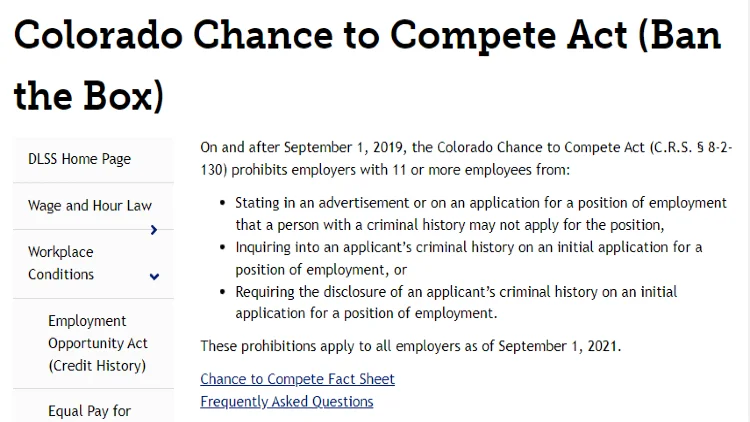
As an employer, it is important to know the ban the box laws in each state so the company is in compliance with the statutes. Ban the box laws dictate what is included in applications, when criminal history checks can be conducted, how far back these checks can go, and what employers can do with the reports once received.
Some states have only limited governmental agencies while others include any employer in the state.
When there is a failed background check after a job offer, there are certain things an employer must consider such as if the charges were dropped or there was not a conviction, ban the box laws, and length of time between conviction and when the person applied for a job. Criminal history should also be weighed against the direct impact a conviction will have on the specific duties of the job applied for.
Guide to Rescinding Job Offer Due to a Failed Background Check
An employer can rescind a job offer at any time following the criminal history check; however, there are certain protocols that should be followed when doing so. First, the employer must be notified at the beginning that the conditional offer is contingent upon the results of the background check.
Having a strong hiring policy, and sticking to that policy, will also help employers when a job offer has to be taken back. It’s important to understand key terms when making a decision to rescind a job offer as well.
The decision to rescind a job offer should be in writing, outlining what steps were taken when coming to the decision, and an opportunity to appeal the decision if applicable, as well as where the individual can file a complaint if they feel the decision was unlawful or discriminatory in nature.
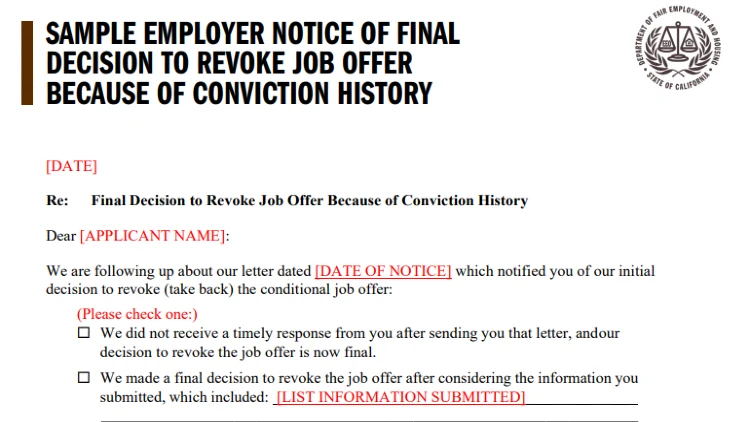
An example of a legally complying document that rescinds a job offer due to conviction history.
Checking the Hiring Policy
The company’s hiring policy guides how and when a job offer is rescinded due to failed background check after job offer so reviewing the hiring policy for details on state and federal laws regarding credit and criminal history, check steps for verifying information on background checks, and know which agencies should be consulted for verification.
Update the release of information form each time the laws or policies change to reflect the most current information.
When taking adverse action based on information in the background check, consult the hiring policy for the steps required by law and company policy. For example, ensure the notification is in writing and includes all the necessary information to rescind the job offer.
The hiring policy should also include step-by-step guidance on how to rescind a job offer if the person has not started working at the company yet, or how to terminate employment if the person has been offered the job and is working in a probationary status. Review the hiring policy for letter or email templates on rescinding a job offer or terminating an employee.4
Full disclosure can help prevent lawsuits or other sanctions on an employer when they rescind a job offer after a background check fails. The disclosure form should outline who will be conducting the background check, what the company is looking at, and how the information will be used.
Disclosure forms should also clearly state what will happen if the background check fails such as rescinding the job offer, or making additional inquiries.
Use the company’s disclosure form to get consent to conduct a background check, and make sure you are using the latest consent form. Advise the candidate verbally what the background check will entail, and make sure the potential employee fully understands before giving consent to the screening.
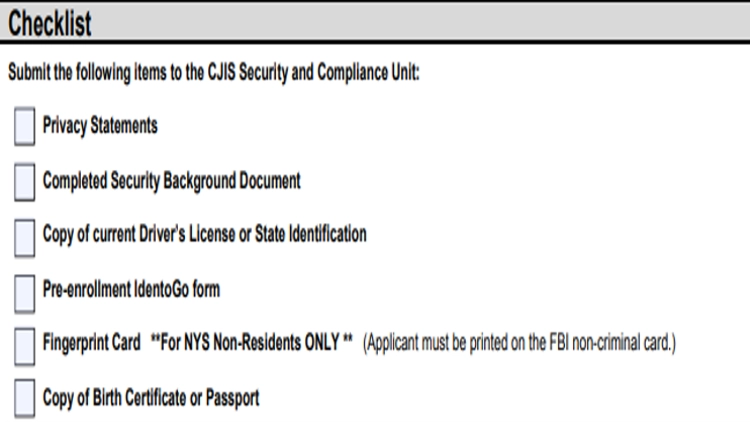
Disclosure of what is found in the criminal background check and how it was used in making the decisions to rescind is also vital. Disclosure at this stage should also be verbally and in writing, and include where the individual can appeal the decision or file a discrimination complaint if they feel they are the victim of unlawful practices.
Discrimination complaints are typically handled by the EEOC when based on unfair hiring practices due to background checks.5
Communicating With the Candidate
While some people may use the terms candidate and applicant interchangeably, there are distinct differences. Applicants are simply anyone who applies for a job whether they are qualified or not. A candidate, on the other hand, is someone who has been determined to meet the minimum qualifications for a position.6
When rescinding a job offer, a letter is forwarded to the candidate explaining why they are no longer being considered for the position and what steps they can take next.
Education Background Check Fails: Next Steps
Certain positions require a minimum education level in order to be considered a candidate for the job. The job posting should clearly state what the minimum education requirement is for the position, as well as a statement that transcripts will be required.
When an education background check failed, the company can rescind the job offer if the candidate cannot show official documentation that the failed record was in error.
The letter to rescind a job offer should include if the decision was based on failed education verification, and steps the candidate can take to appeal or correct the record.
Handling a Failed Credit Check
Job candidates should be notified in writing and verbally when a credit check will be conducted as part of the employment screening process. The company must obtain written consent of the candidate before running a credit check, along with the disclaimer that failure to consent to the check could result in the person no longer being considered for the job.
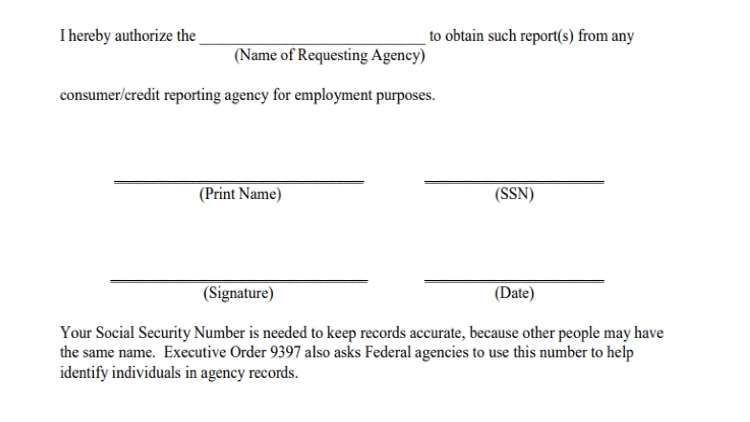
Credit checks have their own requirements when a job offer is rescinded based on a person’s credit history. State and federal laws also limit the types of positions that can consider a person’s credit history when making hiring decisions.
The Federal Trade Commission (FTC) oversees FCRA compliance when using credit history for job candidate screening. The FTC provides the following guidance on taking adverse action, such as rescinding a job offer, following a failed credit check:
- The person must be notified the job offer is being rescinded due to information contained in the report,
- The contact information on the company that completed the credit report,
- A statement that the company that conducted the credit report was not involved in the hiring decision, they are simply a third-party provider of the information, and
- The candidate has the right to dispute the information in the report and get a free copy of their credit report within 60 days from the company that completed the search.4
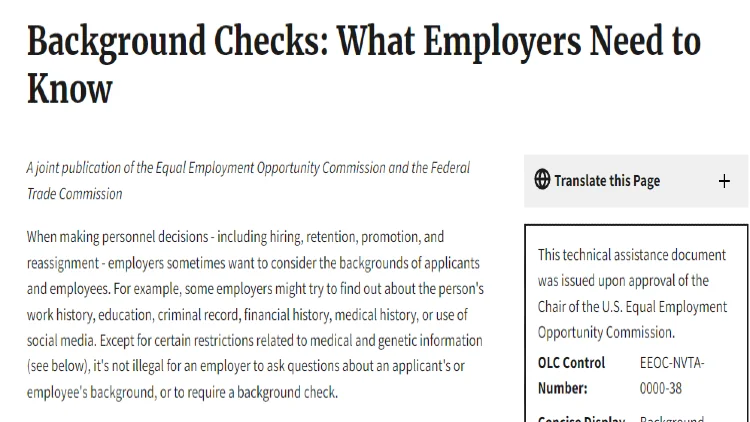
When using failed credit history as the basis to rescind a job offer, the company needs to make sure their communication is in compliance with FCRA guidance. If a candidate feels the company has used credit history in a discriminatory manner, the candidate can reach out to the EEOC and file a formal discrimination complaint.
What To Do Next If a Background Verification Fails?
If a candidate fails a background check, as an employer, there are some options. First, the candidate should be informed they did not pass the background check and why, and best practices dictates allowing the candidate to dispute or explain the negative item.
For example, if a decision to rescind is based on failed credit history due to bankruptcy, the candidate can explain the circumstances that caused the filing and what steps they have taken to regain control over personal finances.
While information can be provided to the candidate in person, over the phone, or in writing for most matters, best practice is to send a letter to the candidate outlining why the job offer is being taken back and what part of the background check was used to make the determination. Not only does this give the candidate instructions on how to appeal the decision if possible, but it also provides the employer with documentation if needed in the future.
Steps should be taken to make sure the information provided was not included in error on the background report when negative information appears. Employers should also make sure the background check is in compliance with state and federal laws if it is being used as the basis to deny employment.
At times, background check information may be inaccurate, and the candidate should be informed of their right to dispute information when it does appear erroneously, or when information that should not have been public record appears on a background check.
The table below lists where candidates can report inaccurate criminal history information when a failed background check after job offer has occurred:
Dispute of errors on educational background reports should be directed to the educational institution that generated the record. For example, if a person’s college transcript does not reflect all the courses passed, the person should reach out to the college or university records department to correct the error.
Disputes of inaccurate credit history can be directed to the third-party site that conducted the background check to correct the error. If they fail to correct the mistakes, the person can sue that company for damages caused by the inaccurate report.
When a potential employee notices there are inaccuracies on their background report, they should immediately notify the prospective employer of the inaccuracies and what steps are being taken to correct them.
Employment Background Check Failed: Top Reasons & Disqualifications
An unsuccessful background check after job offer can happen for a number of reasons, but the most common reasons a person fails a background check include:
- Criminal Convictions: A person with criminal convictions can be disqualified from a position if the conviction directly impacts their ability to perform the job. For example, if a person applies for a job in a daycare, but has a conviction for a crime against children, this would automatically disqualify them from the position.
- Pre-Employment Drug or Alcohol Screenings: When someone fails a drug or alcohol test, employers can rescind a job offer at that time, especially for positions that would put the other employees and the public at greater risk.
- Failed Credit Check: This could include negative repayment history, and in some cases, bankruptcies. If an employee or candidate has a bankruptcy on their credit history, the employer should give them an opportunity to disclose why they filed bankruptcy. Some companies will take into consideration things such as divorce, medical issues or other disasters that can lead to bankruptcy.
- Driving History: For jobs that require regular use of a motor vehicle or heavy equipment, a negative driving record can be a disqualifier for a position. Traffic violations may appear on criminal background checks and can be used by employers to assess suitability for employment.
- Employment Records: While having gaps in your employment history isn’t always a disqualifier, a number of gaps or the appearance of jumping from position to position can indicate poor employment ethics and disqualify a candidate from a position.
- Educational Background: Lack of the necessary education level to perform a job can result in a job offer being rescinded.
Can an Employee Be Fired If They Fail a Background Check After Starting the Job? Can They Be Offered a Different Position With the Company?
When passing a background screening is required for a position, a person can be terminated from a job due to a failed background check after starting job. The company still must follow the requirements for notifying a person of the adverse action taken, why the decision was made and how the person may appeal the decision.
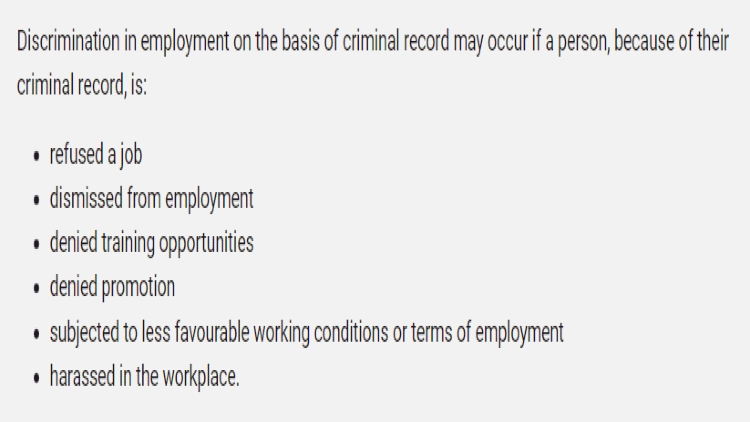
Companies have the option to see if alternate employment with the agency is possible following a failed background check; however, this would be based on why the screening failed in the first place. For example, if the background check failed because the person lied about their qualifications or tried to keep certain violent convictions secret, the company will be less willing to work with the person on alternate placement.
Candidates can get a free credit report each year from all three major credit reporting agencies from the federal government endorsed annual credit report site. This not only helps them keep track of information, it allows them to see if there are errors and provides guidance from each reporting agency on how to dispute inaccuracies.
Summary on Denying Employment, Rescinding Job Offers, & Taking Adverse Action Legally
Ultimately, employers have a huge responsibility when using a background check as part of the hiring process. When an unsuccessful background check after job offer results in rescinding the offer, the employer wants to make sure they have followed all the legal requirements for conducting the screening, using the information correctly, and notifying the candidate of the adverse action.
The following points should be taken into consideration before communicating with the employer and sending notice:
Legalities: State and federal laws govern what can be searched and how information can be used when making the decision to rescind a job offer. FCRA, EEOC, and ban the box laws outline these requirements and are central to the hiring and discharge policy for a business or agency.
Hiring Policy and Disclosure Forms: Hiring policy must be reviewed regularly and updated to reflect changes in legalities, company policy and types of screenings based on updated position descriptions. Disclosure forms should also be updated regularly to reflect new or revised laws and wording should be clear to avoid misunderstandings.
Furthermore, a company’s hiring policy should be in writing and accessible to the public. The policy should adhere to all federal and state statutes regarding labor practices, background checks and list the steps and procedures for hiring and terminating employees.
Denying Candidate Employment: The decision to rescind a job offer is not an easy one. Even when all legalities are in place, and policy has been clearly explained by the employer to the candidate, letting that person know the job offer is no longer on the table can be tough. While it isn’t easy giving someone bad news, keep in mind the bigger picture. It is better to rescind the job offer than put someone in a position that may cause harm to the public and the company or agency.
Hiring employees can be a complicated and daunting task. Companies want the best workers on the market and use background checks to help find the best, but sometimes background checks fail. This guide helps employers know what to do when a failed background check after job offer happens.
Frequently Asked Questions
Does Failing a Background Check Mean I Won’t Get the Job?
A failed background check does not necessarily mean you won’t be hired. If you feel the information on the background check is inaccurate, you can dispute the information and request the potential employer work with you and correct the mistakes and proceed with the hiring process.
If the Background Verification Fails, What Are the Consequences?
When a background verification fails, the company can rescind the job offer or terminate the employee if the person has already started the job. Additionally, the company can work with the applicant to either get greater clarification of what’s on the background report or correct errors on the report. Applicants have the right to dispute information reported in error or in violation of state or federal laws.
1 Table 2. Hires levels and rates by industry and region, seasonally adjusted – 2022 M08 Results. (n.d.). Bureau of Labor Statistics. Retrieved October 26, 2022, from <https://www.bls.gov/news.release/jolts.t02.htm>
2 Kumok, Z. (2019, December 12). Jobs You Need Good Credit to Get – Self. Credit Builder. Self Credit Builder. Retrieved October 26, 2022, from <https://www.self.inc/blog/jobs-you-need-good-credit-to-get>
3 Enforcement Guidance on the Consideration of Arrest and Conviction Records in Employment Decisions under Title VII of the Civil Rights Act. (2012, April 25). Equal Employment Opportunity Commission. Retrieved October 26, 2022, from <https://www.eeoc.gov/laws/guidance/enforcement-guidance-consideration-arrest-and-conviction-records-employment-decisions>
4 Hiring Policy and Procedures. (n.d.). SHRM. Retrieved October 26, 2022, from <https://www.shrm.org/resourcesandtools/tools-and-samples/policies/pages/cms_001677.aspx>
5 Background Checks: What Employers Need to Know | U.S. (2014, March 11). Equal Employment Opportunity Commission. Retrieved October 26, 2022, from <https://www.eeoc.gov/laws/guidance/background-checks-what-employers-need-know>
6 Are you a Candidate or an Applicant? Is there a difference? (2017, May 16). LinkedIn. Retrieved October 26, 2022, from <https://www.linkedin.com/pulse/you-candidate-applicant-difference-tony-cornett->

